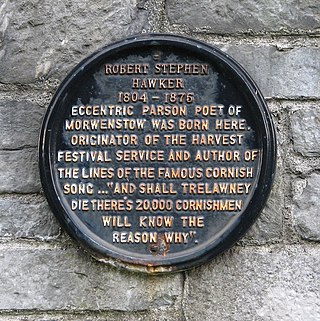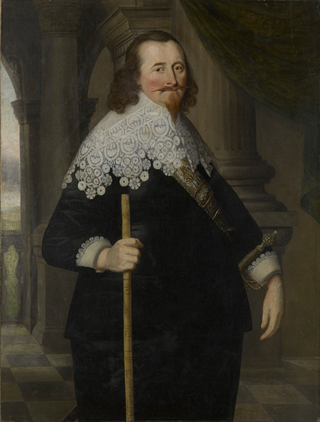Related Research Articles

"The Song of the Western Men", also known as "Trelawny", is a Cornish patriotic song, composed by Louisa T. Clare for lyrics by Robert Stephen Hawker. The poem was first published anonymously in The Royal Devonport Telegraph and Plymouth Chronicle in September 1826, over 100 years after the events.

Sir Jonathan Trelawny, 3rd Baronet was an English Bishop of Bristol, Bishop of Exeter and Bishop of Winchester. Trelawny is best known for his role in the events leading up to the Glorious Revolution which are sometimes believed to be referenced in the Cornish anthem "The Song of the Western Men".

Sir Jonathan Trelawny, 2nd Baronet, of Trelawny in the parish of Pelynt in Cornwall, England, was a Member of Parliament.

Sir John Trelawny, 4th Baronet, of Trelawne in Cornwall, was an Cornish politician who sat in the House of Commons from 1713 to 1734. Trelawny was the eldest son of Sir Jonathan Trelawny, 3rd Baronet and his wife Rebecca Hele, daughter of Thomas Hele of Bascombe, Devon. His father was Bishop of Bristol, Bishop of Exeter and Bishop of Winchester. He matriculated at Christ Church, Oxford on 26 January 1708. He married Agnes Blackwood daughter of Thomas Blackwood of Scotland. He succeeded his father in the baronetcy on 19 July 1721.

The Trelawny, later Salusbury-Trelawny Baronetcy, of Trelawny in the County of Cornwall, is a title in the Baronetage of England. It was created on 1 July 1628 for John Trelawny of Trelawny in the parish of Pelynt in Cornwall. The family derived much of their political power from their patronage of the nearby pocket borough of East Looe. The second Baronet sat as Member of Parliament for East Looe, Cornwall and Liskeard. The third Baronet was a clergyman and one of the Seven Bishops imprisoned by James II. The fourth Baronet represented West Looe, Liskeard and East Looe in the House of Commons. The fifth Baronet was Member of Parliament for East Looe. The sixth Baronet sat as Member of Parliament for West Looe and served as Governor of Jamaica. The eighth Baronet was Member of Parliament for East Cornwall 1832–1837 and Lord-Lieutenant of Cornwall. In 1802 he assumed the additional surname of Salusbury. The ninth Baronet represented Tavistock and East Cornwall in Parliament.

Brigadier-General Henry Trelawny was a British Army officer of Cornish descent, a Member of Parliament and Vice-Admiral of Cornwall.
Captain John Trelawny was an English army officer of Cornish descent, the eldest son of Sir Jonathan Trelawny, 2nd Baronet.

Major General Charles Trelawny, also spelt 'Trelawney', was an English soldier from Cornwall who played a prominent part in the 1688 Glorious Revolution, and was a Member of Parliament for various seats between 1685 and 1713.
Efford is an historic manor formerly in the parish of Eggbuckland, Devon, England. Today it has been absorbed by large, mostly post-World War II, eastern suburb of the city of Plymouth. It stands on high ground approximately 300 feet above the Laira estuary of the River Plym and provides views over long distances: to the north across Dartmoor, to the east and south-east across the South Hams. It consists predominantly of local authority and housing association properties. Before this land was built upon it was known as 'The Wilds of Efford', and was largely unspoilt countryside and marsh land. That a deer park may have been attached to the manor is suggested by the survival of the street name "Deer Park Drive".

Sir Harry Trelawny, 5th Baronet, of Whitleigh, Devon, was a British Army officer and Tory politician who sat in the House of Commons from 1708 to 1710.

Sir John Trelawny, 1st Baronet was a Cornish baronet and soldier from Trelawne, Cornwall. He was High Sheriff of Cornwall. A Royalist MP, he fought for Charles I in the English Civil War.

Sir William Lewis Salusbury-Trelawny, 8th Baronet, was a British politician.

Sir John Salusbury Salusbury-Trelawny, 9th Baronet, was a British Liberal politician.

Sir Jonathan Trelawny, of Pool in Menheniot, Cornwall, was an English Member of Parliament. Trelawny was the posthumous younger son of John Trelawny of Pool ; his elder brother died in infancy and he inherited the estate. He entered Parliament as member for Liskeard, representing that borough in three parliaments, and subsequently also represented Cornwall in the Parliaments of 1597 and 1604. On one occasion he was sent to the Tower of London for losing his temper during a parliamentary debate where he "dealt his opponent, Mr Ashe, a thundering box to his ear" and "flashed his sword".

Sir Edward Seymour, 2nd Baronet was an English landowner and politician who sat in the House of Commons between 1601 and 1625. He was an ambassador to Denmark. During the English Civil War, he supported the Royalist cause.

Sir Francis Bassett of Tehidy in the parish of Illogan in Cornwall, was Sheriff of Cornwall, a Vice-Admiral of North Cornwall, and Recorder of St Ives. His portrait by Vandyck was formerly displayed at Tehidy. He appears to have been a sportsman, much addicted to hawking and cock-fighting.

Members of the Basset family were amongst the early Norman settlers in the Kingdom of England. It is currently one of the few ancient Norman families who has survived through the centuries in the paternal line. They originated at Montreuil-au-Houlme in the Duchy of Normandy.
Trelawne is an historic manor in the parish of Pelynt in Cornwall, England, situated 20 miles (32 km) west of Plymouth, Devon and four miles (6.4 km) west-northwest of Looe, Cornwall. It was long the seat of the Trelawny family, later Trelawny baronets, one of the most eminent of Cornish gentry families, much of whose political power derived from their control of the pocket borough of nearby East Looe. The surviving grade II* listed manor house known as Trelawne House is today used for holiday accommodation and entertainment, under the name "Trelawne Manor Holiday Park".
Trelawny or Trelawney is a habitational surname that originated in Cornwall. The family are said to have descended from Haemlin, who held several manors from Robert, Count of Mortain, according to the Domesday Book.
References
- Arthur Collins, The English Baronetage, Volume 2 (London: Thomas Wotton, 1741)
- Burke's Peerage and Baronetage (London: Henry Colburn & Richard Bentley, 1832)
- Vivian's Visitations of Cornwall (Exeter: William Pollard & Co, 1887)
- Richard Polwhele and John Whitaker, The Civil and Military History of Cornwall (London: Cadell & Davies, 1806)